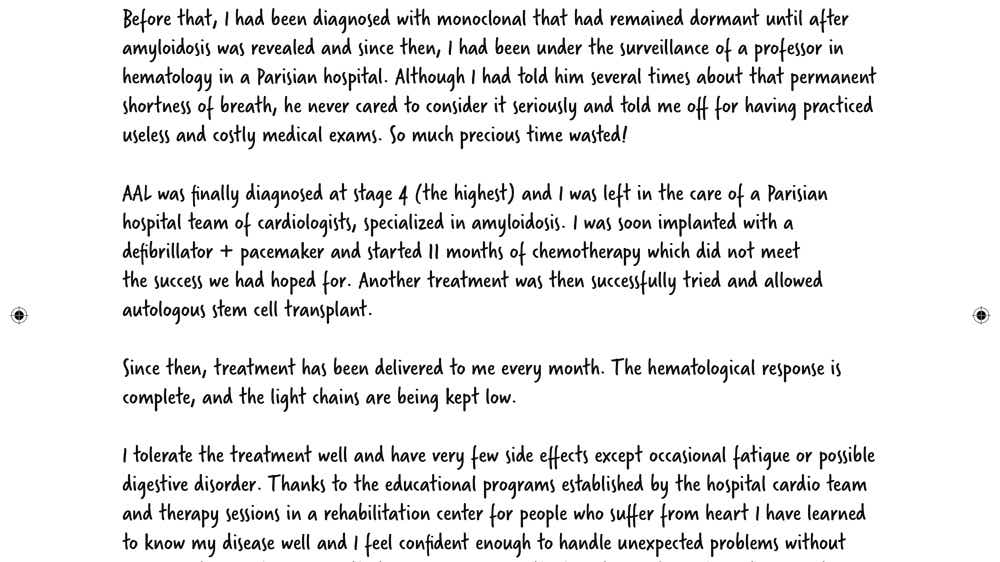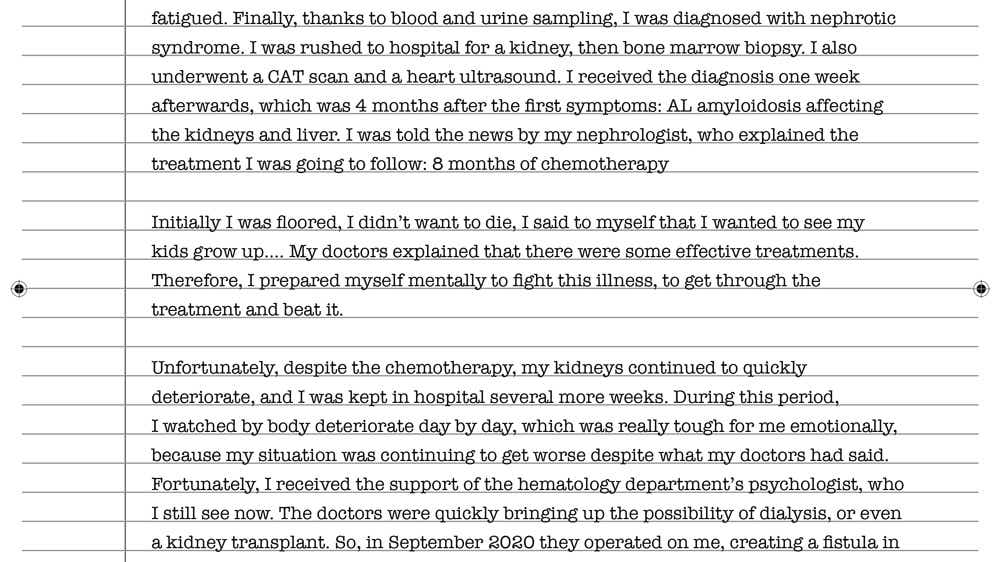AL Amyloidosis
Living with AL amyloidosis
Tips on how to manage day-to-day with AL amyloidosis
AL amyloidosis can significantly impact your life both physically and emotionally. It is important you take a holistic approach to care, that considers both your physical and mental wellness. There are some tips on this page that can help you make positive health choices. But remember, if you are experiencing symptoms you should talk to your doctor or nurse to get advice, especially if there has been a sudden change.
What to expect in your journey
The journey to receiving an AL amyloidosis diagnosis can be long and frustrating. Almost one-third of people with the condition will visit over five physicians before getting diagnosed. Around 70% will wait over a year after symptoms first begin before receiving a diagnosis.
Part of the problem in reaching the correct diagnosis is that symptoms can be similar to lots of other, often more prevalent, diseases. In patients that experience damage primarily to the heart, diagnosis can take longer compared to those with kidney damage. Research shows, by seeking earlier medical help, you can get a more accurate interpretation of your initial symptoms for a faster diagnosis.
However, awareness of AL amyloidosis amongst doctors is relatively low and can delay diagnosis. So if you think you may have the condition, do tell your doctor.
The good news is that once you have a diagnosis, you will be able to access a range of healthcare professionals (a multidisciplinary team [hyperlink to above]) to support you across your entire care pathway. They will work together to determine the best course of treatment for you, based on your specific disease journey.
Managing symptoms
The symptoms of AL amyloidosis can be painful and exhausting. But there are some small considerations and changes your healthcare team may recommend as a complementary approach to primary treatment.
- Eat healthily and lower your salt intake.
Try to drink 2–3 litres of water a day to stay hydrated (unless your doctor has advised otherwise).
Be sensible about moving around, taking your ableness into account.
Record any symptoms or side effects you are experiencing. Be sure to tell your doctor about them.
Keep a record of your medical history, treatments and test results. It will help give you a better understanding of your condition. It may also be helpful when dealing with other healthcare professionals who are less familiar with your condition.
Nerve damage could be the reason you experience some symptoms, like a tingling or prickling sensation (similar to pins and needles), increased sensitivity to temperature, numbness or weakness in the hands and feet. To help relieve some of these symptoms, you can:
- Keep your hands and feet warm.
Use light bed covers. This reduces the pressure on your legs and makes it easier to move in bed.
Be careful when using sharp objects such as knives or scissors. Numbness can affect your grip.
Wear appropriate shoes to avoid pain, and check your feet for redness or blisters every day.
Check the temperature of your bath or shower water before you get in to avoid scalding yourself. Use a bath thermometer, or ask someone else to check the temperature for you.
Do light physical activity such as walking, to improve blood circulation.
Stop smoking. Nicotine and other chemicals in cigarettes (including e-cigarettes) can damage blood vessels, making it harder to manage your symptoms. Smoking can also delay healing after treatment. Talk to your healthcare team for information about support available to help you quit.
Think about using mobility aids, such as a walking stick or frame, to help with your everyday tasks.
What can you do when your pain relief does not work?
The first thing you should do is talk to your healthcare team. Tell your doctor, or nurse so they can adjust the dose or offer you a different pain relief treatment.
At times, it may feel as if your symptoms are hard to manage, which can be emotionally exhausting. Just try to focus on priorities by asking these questions:
1. What is really important to me?
2. What practical steps can I take to improve my quality of life today?
3. How can I spend more time with my family and friends?
4. Can I spend more time on my hobbies and interests?
5. What can I hope for?
6. What could help me to relax?
7. What type of physical activity could I do to help me rest more easily?
Staying healthy
Diet and exercise can be a helpful way to manage some of your symptoms. How you move, eat and drink could be useful for relieving some of the pain, but you should always be mindful of your limits. Talk to your team of healthcare professionals, and ask for their advice based on your specific set of symptoms and disease progression.
Mental health
An AL amyloidosis diagnosis can be an uncertain time, you may feel confused, anxious, depressed or even angry, and may want to withdraw from people. Feelings like these are only human. Your situation is complicated, and everyone will process their diagnosis in their own way. If you are anxious about your illness or treatment, talk about your worries with your family and friends, or whoever else you use as a support network.
Do not hesitate to talk to any of the healthcare professionals taking care of you. As the saying goes: knowledge is power. The more information you have, the more you will feel in control. Putting you in a better position to make informed decisions.
Here are some other practical tips that might help you manage your mental health:
- Keep a diary - to help you understand your feelings. It is also good place to note any symptoms or side effects you may be experiencing.
Join a support group - to share your experiences with people in the same situation.
Tell your doctor or nurse how you are feeling - they may be able to suggest resources or refer you to someone who can help.
Talk to family and friends - they can be a fantastic source of practical and emotional support.
It is important to recognise when stress or negative feelings turn into depression. If this happens you must talk to your doctor or nurse. They can then refer you to a psychologist or psychiatrist who will be best placed to help you.
Some signs of depression are:
You find it hard to sleep
You are unable to concentrate
You lose interest in most activities
You regularly feel low
If you are depressed, let people know why. Some friends or family members may not understand why you feel depressed, but keep being open and honest with them. Encourage them to do the same with you.
Patient Testimonials
The following video stories represent real patients across Europe and aim to highlight the challenges around living with AL amyloidosis.
In our videos, we share stories based on real patient experiences. To protect the privacy of these individuals, we have used actors to portray the events.
Welcome to our collection of patient letters. Each letter is a heartfelt account written by real patients, sharing their personal experiences. Please click on a letter below to read their inspiring stories in their own words.
A big thank you to all our patients for generously giving their time to support the community. Your contributions are deeply appreciated!


